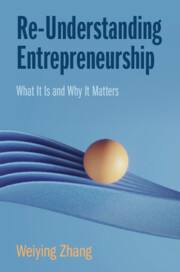Re-Understanding Entrepreneurship
How do entrepreneurs make decisions in the real world? Why are entrepreneurs absent from mainstream economics? What functions do entrepreneurs play in the market? What type of institutional environment is needed for entrepreneurship to play a role? Neoclassical economics is a market theory without entrepreneurship. This misconception distorts our understanding of how the real market works, leading to a theory of market failure that forms the common foundation of various government interventions. The market is not only an allocative process but, more importantly, a discovery and creative process. To understand the real market, Weiying Zhang argues that economics must shift from a price-centric to an entrepreneur-centric paradigm. Blending theory and narrative, Zhang intersects history with the present supporting his theory with relevant case studies. He argues that once entrepreneurship in the market is correctly understood, the foundation for government intervention is undermined and the economy can sustainably flourish.
- Discusses how common hatred for the rich, business activities, and entrepreneurs in human history results partly from the misunderstanding of entrepreneurial decisions, and how a correct theory of entrepreneurship is needed
- Argues that market theory without entrepreneurship is a misconception of the market and that public policies based on such a theory are misleading and detrimental to economic development
- Analyzes how entrepreneurs make business decisions in the real world using intuition, imagination and judgement, breaking away from rational decision thinking
Reviews & endorsements
'Combining vivid real-life examples with sound logic, this book illustrates how the neoclassical theory of economics overlooks the main driving force of economic development - entrepreneurship. This book reflects Professor Zhang's deep and critical thinking about China's economic miracle in the past forty years, highlighting the importance of the agency and creativity of individual entrepreneurs in the face of numerous political, legal, and institutional ambiguities and barriers.' Xiao-Ping Chen, Philip M. Condit Endowed Chair Professor in Business Administration, Michael G. Foster School of Business, University of Washington
'A major advance in our understanding of entrepreneurship and of the essential role it plays in the economy.' Meir Kohn, Professor of Economics, Dartmouth College
'Weiying Zhang is one of the most important economists of our time. I have learned a lot from him. At the center of his thinking is, quite rightly, the entrepreneur. Entrepreneurial ideas are the most important thing in capitalism - and we all owe our prosperity primarily to entrepreneurship.' Rainer Zitelmann, Historian, sociologist, entrepreneur, and author of In Defense of Capitalism (published in thirty languages)
Product details
May 2024Paperback
9781009453363
377 pages
228 × 152 × 20 mm
0.552kg
Available
Table of Contents
- Preface
- Part I. The Nature of Knowledge and Entrepreneurship:
- 1. Soft knowledge and entrepreneurship
- 2. Understanding entrepreneurial decisions
- 3. Big data cannot replace entrepreneurs
- 4. Prejudice and hostility towards entrepreneurs
- Part II. Entrepreneurs in Market Theories:
- 5. The two paradigms of the market
- 6. What is a good market theory?
- 7. Entrepreneurship is the best anti-monopoly law
- 8. Entrepreneurial profit and common prosperity
- Part III. Uncertainty of Innovation and Industrial Policy:
- 9. Entrepreneurs in economic growth: arbitrage and innovation
- 10. The uncertainty of innovation
- 11. The airship and airplane duel
- 12. Entrepreneurship and industrial policy
- Part IV. Institutional Ecology of Entrepreneurship:
- 13. What determines the allocation of entrepreneurial talents?
- 14. Entrepreneurs and capitalists
- 15. Protection of rights versus protection of interests
- 16. Challenges for entrepreneurs from conflicting values
- Appendix A: My journey studying entrepreneurs
- Appendix B: How I came to know the Austrian School of Economics
- References
- Index.





